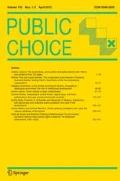Abstract
This paper offers new insights on theinteractions between economics and politicsin Portugal. We use two unexplored datasets consisting of monthly polls on voteintentions for the main political partiesin Portugal and responses to a consumersurvey containing a battery of questions oneconomic evaluations. The analysis coversthe interval from 1986 to 2001. We findthat: (1) right-wing governments arepenalized for higher inflation while theleft-wing ones are not, (2) left-winggovernments are more penalized forincreases in the unemployment rate; (3)voters base their evaluations ofincumbents' performances on perceptions ofpast and current economic conditions,rather than on expected future economicoutcomes.
Similar content being viewed by others
References
Alesina, A. and Cukierman, A. (1990). The politics of ambiguity. Quarterly Journal of Economics 105: 829–850.
Banks, A. (Ed.). Political handbook of the world. New York: McGraw-Hill. Several issues.
Colomer, J.M. (1996). Spain and Portugal: Rule by party leadership. In J.M. Colomer (Ed.), Political institutions in Europe, 170–210. London: Routledge.
Downs, A. (1957). An economic theory of democracy. New York: Harper and Row.
Fair, R.C. (1978). The effect of economic events on votes for President. The Review of Economics and Statistics 60: 159–173.
Frey, B.S. and Schneider, F. (1978). An empirical study of politico-economic interaction in the United States. Review of Economics and Statistics 60: 174–183.
Goodhart, C.A.E. and Bhansali, R.J. (1970). Political economy. Political Studies 18: 43–106.
Harrington, J. Jr. (1993). Economic policy, economic performance, and elections. American Economic Review 83: 27–42.
Hibbs, D.A. (1977). Political parties and macroeconomic policy. American Political Science Review 71: 1467–1487.
Kirchgässner, G. (1986). Economic conditions and the popularity of West German parties: A survey. European Journal of Political Research 14: 421–539.
Kramer, G.H. (1971). Short-term fluctuations in US voting behavior, 1896–1964. American Political Science Review 65: 131–143.
Laakso, M. and Taagepera, R. (1979). Effective number of parties: A measure with application to Western Europe. Comparative Political Studies 12: 3–21.
Lanoue, D.J. and Headrick, B. (1994). Prime Ministers, parties and the public: The dynamics of government popularity in Great Britain. Public Opinion Quarterly 58: 191–209.
Lewis-Beck, M.S. (1988). Economics and elections. Ann Arbor: The University of Michigan Press.
Magone, J.M. (1997), European Portugal: A difficult road to sustainable democracy. Riverside, NJ: Macmillan.
Mueller, J.E. (1970). Presidential popularity from Truman to Johnson. American Political Science Review 64: 18–23.
Nannestad, P. and Paldam, M. (1994). The VP-function: A survey of the literature on vote and popularity functions after 25 years. Public Choice 79: 213–245.
Person, T. and Tabbellini, G. (2000). Political economics — explaining economic policy. Cambridge, MA and London, U.K.: The MIT Press.
Powell, G.B. Jr. and Whitten, G.D. (1993). A cross-national analysis of economic voting: Taking account of the political context. American Journal of Political Science 37: 391–414.
Rogoff, K. and Sibert, A. (1988). Elections and macroeconomic cycles. Review of Economic Studies 55: 1–16.
Smyth, D.J., Washburn, S.K. and Dua, P. (1989). Social preferences, inflation, unemployment, and political business cycles: Econometric evidence for the Reagan Presidency. Southern Economic Journal 56: 336–348.
Stigler, G. (1973). General economic conditions and national elections. American Economic Review, Papers and Proceedings 63: 308–315.
Swank, O.H. (1993). Popularity functions based on partisan theory. Public Choice 75: 339–356.
Veiga, L.G. (1998). Popularity functions for the Portuguese Prime Minister, Government, Parliament and President. European Journal of Political Research 33: 347–361.
World Europa Yearbook. London: Europa Publications. Several issues.
Author information
Authors and Affiliations
Rights and permissions
About this article
Cite this article
Veiga, F.J., Veiga, L.G. The Determinants of Vote Intentions in Portugal. Public Choice 118, 341–364 (2004). https://doi.org/10.1023/B:PUCH.0000019913.00616.e2
Issue Date:
DOI: https://doi.org/10.1023/B:PUCH.0000019913.00616.e2




